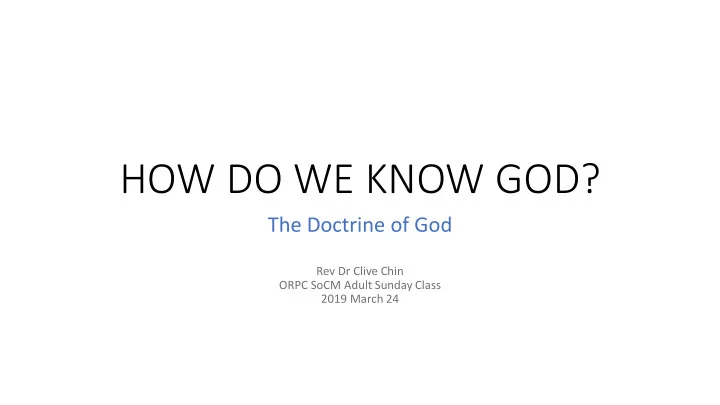

HOW DO WE KNOW GOD? The Doctrine of God Rev Dr Clive Chin ORPC SoCM Adult Sunday Class 2019 March 24
Introduction • The Westminster Shorter Catechism states, “That the chief aim of man is to know God and enjoy him forever.” • “But let him who boasts boast in this, that he understands and knows me, that I am the Lord” (Jer 9:24 ESV)
John 3 • Nicodemus said, “Rabbi, we know you are a teacher who has come from God” (3:2) • that Jesus performed many miracles • these miracles authenticated him as a teacher from God • Jesus was one to whom he should listen • Jesus rebutted, “I tell you the truth, no one can see the kingdom of God unless he is born again” (3:3)
John 3 • “How can a man be born when he is old? Nicodemus asked, ‘Surely he cannot enter a second time into his mother’s womb to be born!’” (3:4) • Jesus answered, “Very truly I tell you, no one can enter the kingdom of God unless they are born of water and the Spirit” (3:5; cf. Eze 36:25-27) • Jesus said that true knowledge began with spiritual knowledge found in God’s revelation of himself in the Bible
Contemporary Crisis of Knowledge • Approach to knowledge by reason alone (e.g., science) • Approach to knowledge through experience (e.g., Jesus loves me) • Approach to knowledge by the Holy Spirit in accordance with his word (1 Cor 2:10-13)
Knowing God Personally • “The fear of the Lord is the beginning of knowledge” (Provb 1:7) • “The fear of the Lord is the beginning of wisdom and the knowledge of the Holy One is insight” (Provb 9:10) • Knowing God in relationship to us ( yada and ginosko ) • Knowing God in the context of knowing ourselves • Knowledge of God takes place in the context of Christian piety, worship, and devotion
J. I. Packer on Knowing God • A matter of personal dealing — knowing about him vs. knowing of him or dealing with him. Knowing about him is a precondition of trusting in him (Rom 10:14) • A matter of personal involvement — mind, will, and feeling (Ps 34:8) • A matter of grace — because God initiates the relationship and reveals himself to us
J. I. Packer on Knowing God • Involves listening to and applying God’s Word • Notes God’s nature and character • Accepts his invitation and obeys his commands • Draws one into a divine fellowship
Evidences of Knowing God • Those who know God have great energy for God • Those who know God have great thoughts of God • Those who know God show great boldness for God • Those who know God have great contentment in God
Question How may I know and understand the Bible? • From the divine standpoint, it is the doctrine of the illuminating ministry of the Holy Spirit • From the human standpoint, it is the exercise of biblical interpretation
Illumination in 1 Corinthians • Revelation or divine wisdom hidden (1 Cor 2:6-8, 10) • It is known and revealed by the Spirit (vv. 9-11) • The Spirit provides the foundation for Christian epistemology (v. 12) • The Spirit illuminates in words taught by the Spirit (v. 13)
Illumination in 1 Corinthians • Knowing God is relational and involves the work of the Holy Spirit (1 Cor 2:10-16) • “What we have received (δεχομαι or “accepted”) is not the spirit of the world, but the Spirit who is from God, so that we may understand what God has freely given us (2:12) • “This is what we speak, not in words (λ ó γοις ) taught ( διδακτοις ) us by human wisdom but in words taught by the Spirit, expressing spiritual truths in spiritual words” (2:13) • The “natural” person is unable to perceive or understand spiritual things (1 Cor 2:14)
Word and Spirit • On the one hand, without the illuminating ministry of the Holy Spirit, the Bible is a dead book for unregenerate people • On the other hand, without proper understanding of the Bible and just the Holy Spirit, the result is mere experience or even relativism
Word and Spirit • The Word of God, correctly interpreted, is the objective basis of authority. Here, the work of the Spirit works in and through sound exegesis • The illuminating work of the Spirit is the subjective dimension. The Spirit works and guides the reader/hearer in applying the Word to contemporary situations • Together, Word and Spirit offer balance
Key Distinctions • Revelation — the act of God whereby he discloses himself to us through general and special revelation • Illumination — the act of the Spirit, whereby he grants spiritual insight and the truthful perception regarding the Bible • Interpretation — the process of understanding the original meaning of the biblical text in its historical, literary, and cultural context
Discussion Questions • How do you know if you are a true Christian? • What is the importance of 1 Cor 2:14 in relation to the Holy Spirit? • What does knowing God mean for you?
Recommend
More recommend